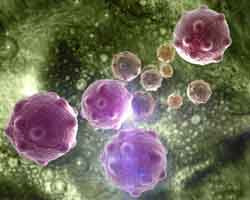The mystery of p63: Tumour suppressor or activator?
The functions of p63 in tumour formation generate much interest and currently are the subject of active research. The existence of six different isoforms of the p63 protein complicates its study. The deltaNp63alfa isoform of p63 is required for normal proliferation of stem cells in many epithelial tissues, including the skin and the prostate gland. While previous data revealed that deltaNp63alfa plays an important role in initiating epithelial tumours, the role of p63 in prostate tumour development remains unclear. With EU funding, the project 'Investigating the role of p63 in prostate stem cells and tumor development' (P63 PROSTUMOR) aimed at a better understanding of p63 function. The project used a multidisciplinary approach, combining functional genetics, in vivo animal models and high-throughput genomic screening. P63 PROSTUMOR started with determining the expression of p63 isoforms in normal prostate tissue and prostate stem cells. The stem cells in mouse and human prostate predominantly expressed the deltaNp63alfa isoform of p63. Scientists then investigated the effects of loss of p63 on normal prostate and during prostate tumour development. The studies involved isoform-specific knockdown in human cells and loss-of-function studies in wild-type mice. The project demonstrated that deltaNp63alfa is required for maintaining these stem cells. Finally, it was possible to identify novel p63 target genes in the prostate tissue. A combination of microarray technology and CHIP-sequencing of human cell lines identified direct targets of p63 and the pathways regulated by p63 in the prostate. P63 PROSTUMOR revealed a critical role for deltaNp63alfa in maintaining the proliferative capacity of prostate stem cells. Identification of the important mechanisms driving prostate stem cell growth advances the understanding of p63 in prostate tumour formation.







